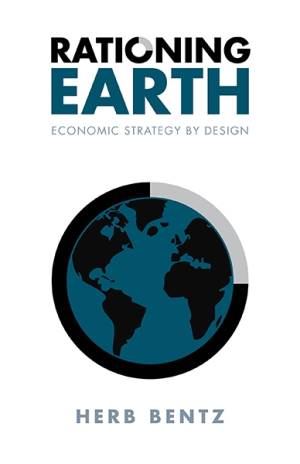Rationing Earth
Economic Strategy by Design
With its thoughtful and complex examinations of design and overconsumption, this book offers potential solutions to looming global problems.
How can we simultaneously boost the world’s wealth and reduce consumption? The short answer is that we can improve the quality of what we produce through better design. This is the focus of Herb Bentz’s well-researched Rationing Earth: Economic Strategy by Design.
Rationing Earth is divided into four parts: “Overconsumption,” “Unemployment,” “Distribution,” and “External Costs.” Each addresses a specific economic problem and its relationship to prosperity and consumption. Subheads are used to help further organize the sections. Bentz uses statistics, historical perspectives, and the research of others to make his argument that design evolves out of necessity and is directly tied to the state of the economy.
Because better-designed products rely on efficient technology and use of sustainable materials, Bentz argues they are more durable, more useful, and more beautiful. While design is key, consumers must also learn to use less and to appreciate higher-quality products that are built to last.
The cost of overconsumption is hefty, but Bentz’s overarching message is that consumption and prosperity are not mutually exclusive. Reducing consumption will not reduce prosperity. Designing better products and being more responsible consumers will ensure that “wealth defined by our satisfaction can increase indefinitely.”
Bentz’s background as an industrial designer and founding partner of Form3 Design, a Vancouver-based company committed to ecologically sustainable product design, factors in. He clearly states Rationing Earth’s objective and makes a compelling argument that expert design is the best way to reduce consumption. To ensure that his message is not lost or forgotten, he continuously restates his objective throughout the book, and expertly connects his research to his points using a strong and passionate tone.
Parts of Hamlet’s suicide-contemplation speech are used to introduce each of the book’s four parts, and Bentz provides thought-provoking modern interpretations of those excerpts. This unique approach demonstrates the timelessness of the book’s issues.
Rationing Earth is not exactly light reading. It’s an interesting, research-based look at the state of the global economy and the environment, and the social and cultural issues that affect the world. The extensive use of footnotes, data, charts, and graphs sometimes distracts from the message. While the book is well written, the structure and writing style are academic, resembling a textbook and perhaps limiting its accessibility.
This book offers a thoughtful and complex look at overconsumption, the economy, and environmental factors, and how design can impact these issues. Rationing Earth presents extensive research to support its arguments and offers potential solutions to some of the world’s biggest problems.
Reviewed by
Erica Sweeney
Disclosure: This article is not an endorsement, but a review. The publisher of this book provided free copies of the book and paid a small fee to have their book reviewed by a professional reviewer. Foreword Reviews and Clarion Reviews make no guarantee that the publisher will receive a positive review. Foreword Magazine, Inc. is disclosing this in accordance with the Federal Trade Commission’s 16 CFR, Part 255.

